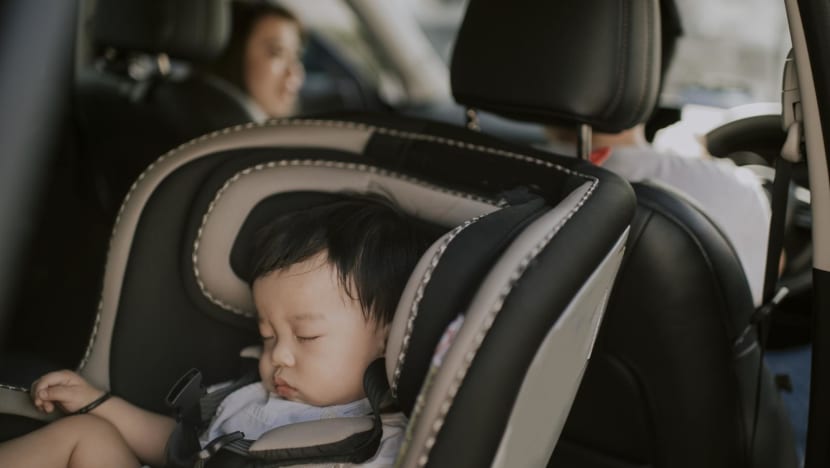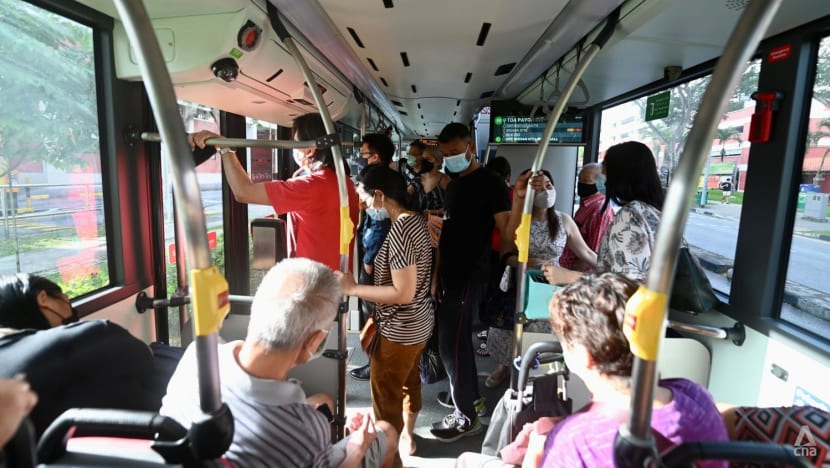With soaring COE prices, why do families with young children still want to buy a car?
Parents CNA spoke to cited troubles with managing very young children on public transport and choosing convenience over cost.

SINGAPORE: It's the most expensive city in the world to buy a car – it even says so in the Guinness World Records – but Singapore is also regularly acknowledged as one of the countries with the best public transport system.
Yet many Singaporeans say they can't do without a car, and despite eye-watering prices, still fork out over six-digit sums for one.
The high cost is largely due to a Certificate of Entitlement (COE) for vehicle ownership, the price of which is included when buying a car. Limited numbers of COEs, which last for 10 years, are released twice a month in a bidding process.
A popular family car like the Toyota Altis – sold with a Category A COE for smaller cars – costs about S$165,000 (US$122,000). The Honda Accord, which is sold with a Category B COE for bigger or more powerful cars, will set you back S$235,000.
Prices have only become more astronomical in recent times. On Wednesday (Jul 5), the first bidding exercise this month, the Category A COE premium reached S$97,000. The Category B premium was S$118,000, near the record high of S$121,000 set in the last tender on Jun 21.
But many are not deterred by the rising premiums. In particular, some parents with young children told CNA that for them, a car is not a luxury but a need.
Mother-of-two Ashley Than and her husband decided to purchase a second car in April, after she gave birth to their second child.
Ms Than quit her job last year to take care of their children, while her husband runs his own business in the construction industry.
The couple bought a secondhand car for S$80,000, which had a COE of four years left.
Their first car, purchased in 2019 when the COE price was about S$50,000, is used by her husband to commute to work. Ms Than uses the second car daily – sending her older son to preschool on weekdays, meeting her parents and parents-in-law twice a week and taking the children out every weekend.
Taking public transport with very young children can be difficult, especially if she is alone, the 29-year-old told CNA.
"I tried taking the bus once when I was pregnant and pushing my son on the stroller. The bus driver refused to bring the ramp down because it's only reserved for the handicapped," she added.
"So I had no choice but to carry the stroller and my son up the bus myself while being pregnant."
A long journey on public transport with very young children can be "quite a nightmare". The children may get cranky and start crying on the bus or train, said Ms Than.
"Plus their immunity is still weak. I wouldn't want to squeeze in the train or bus with the kids, especially the newborn."
Taking a private-hire car is also not as convenient as it sounds – only taxis are allowed to take children as passengers without car seats. If she wants to use a ride-hailing app, she can only opt for cars with a car seat, which often comes with a higher fare.
"On top of having to take care of two young kids, there are so many things to bring along, like the stroller, diapers, milk powder and so on," she added.
"As much as I hate to buy a car when the COE is so high, I don't think I can do without a car because it's really quite inconvenient."

In May, parliament debated the issue of skyrocketing COE premiums. Among the 10 Members of Parliament who spoke, many were concerned that those who need cars, such as families with children and the elderly, as well as people who rely on cars for their livelihood, would not be able to afford one.
In a ministerial statement, Transport Minister S Iswaran laid out a certain future: With Singapore's policy of zero-growth in car population and as household incomes rise, COE premiums are expected to trend upwards.
Even as he announced measures to raise the COE quota for cars in Categories A and B over the next few quarters, he stressed that the country is moving towards a "car-lite future".
A NEED OR A LUXURY?
Father-of-two Michael Teo decided to upgrade from a sedan to a small MPV – a Chevrolet Orlando – after his second child was born. He paid S$110,000 for the car in 2017, including S$55,000 for the COE.
The car model has been discontinued, but a comparable car like the Honda Freed would cost him about S$169,000 now.
Mr Teo spends between S$1,800 and S$2,000 a month on his car, including expenses like insurance, road tax and petrol.
"The car is definitely a lot more useful for families with young kids," the 39-year-old public servant said. "When it was just me and my wife, you could say it's a luxury ... But when we had kids, it became more of a need."
Mr Teo, who considers himself middle-income, said he tries to find "ways and means" not to spend too much on his car.
"The car is a need for me for now, but if I can help it, I will try not to drive so much."
Mr Teo works near Dhoby Ghaut and takes the train to work three times a week, as he works from home on the other days. He leaves the car at home with his wife, which she uses to send the kids – aged seven and 10 – to school every morning.
They did not sign up for the school bus service because it means one hour less of sleep every morning for their children, he added.
The couple also drive their children to enrichment classes once or twice a week, and they use their car when visiting elderly relatives.
"The car adds options to places that we can bring the kids to over the weekend, especially when you want to go to the zoo or a nature park ... the car really helps to save a lot of time," said Mr Teo.
For example, it takes one to two hours to get from his home to Sungei Buloh Nature Park by public transport, but just 30 minutes by car, he added.
"Singapore's weather is quite unpredictable, so suddenly if we need to change plans because of the weather or the kids get tired, the car just gets us home quickly."
Now that his children are older, the family sometimes makes it a point to leave the car at home, he said, adding that his children enjoy the journey on a bus or train.
His car's COE is due to expire in three years. When the time comes for him to replace his car and COE prices are still high, Mr Teo said he would rethink whether he really needs a car.
His children will also be entering secondary school then, and the car will be less important. If he decides to buy a car, he may buy a secondhand one instead, he told CNA.
Mr Teo stopped short of agreeing that every family with children needs a car. "I imagine you can do it without a car as well, it's just that you need to shape your lifestyle a bit differently.
"I'm paying for the time saved for a certain lifestyle, to do certain things. It's not so easy to weigh those two things – time versus cost."

















